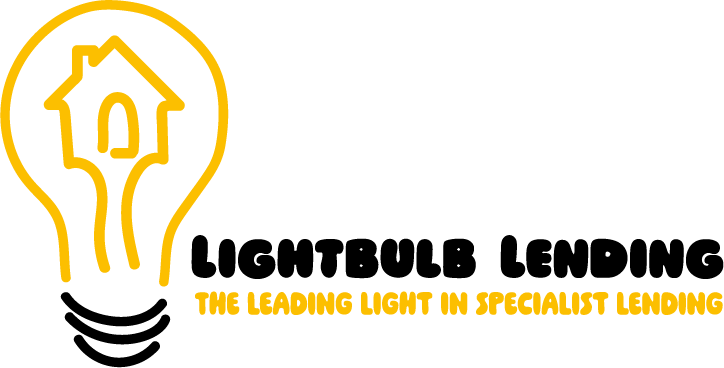When it comes to getting a mortgage, having bad credit can feel like a brick wall. Whether your score has taken a hit due to missed payments, defaults, or something more complex like a CCJ, the common belief is that you’ve got no chance of ever owning a home. But that’s simply not true.
At Lightbulb Lending, we specialise in helping people who may not have a perfect credit history. Our team works closely with a wide panel of lenders, who understand that life happens, and they’re often willing to take a more flexible view. From self-employed workers to those with historic financial difficulties, we’re here to shed light on your mortgage options and guide you through the entire process with compassion, clarity, and no judgement. In this blog post, we’ll dive into the world of bad credit mortgages, with a spotlight on the most common myths we hear daily from our clients. We’ll explain the truth behind these misconceptions and share expert insights to help you make more informed decisions. For more information, please don’t hesitate to contact us today!
Bad Credit Mortgage Myths Debunked
Let’s get straight into the most persistent and often damaging myths surrounding bad credit mortgages. These misconceptions can prevent individuals from even attempting to apply, causing unnecessary stress and prolonging the dream of homeownership. In reality, the mortgage landscape has evolved significantly, and there are more options than ever before for people with a poor credit history. The key is knowing where to look, what to expect, and how to present your circumstances in the best possible light.
Myth #1: You Can’t Get a Mortgage If You Have Bad Credit
The Truth: Having bad credit does not mean you’ll never be approved for a mortgage. Many lenders in the UK mortgage market specialise in helping people with adverse credit histories. While a high street bank may turn you away, there are alternative lenders and specialist products tailored for people with low credit scores, defaults, CCJs, or previous bankruptcy.
These lenders take a more personalised approach, focusing on the story behind your credit issues, not just the numbers. Some may be willing to lend if you can demonstrate a period of stability and affordability, even after recent problems. This means that your financial future isn’t locked in by your past mistakes.
Lightbulb Lending has access to this wider market, and we know exactly where to look to match you with the right lender.
Myth #2: You Need a Huge Deposit
The Truth: While some lenders may require a larger deposit for applicants with bad credit (typically between 10–20%), this isn’t always the case. Factors like how recent your credit issues were, how severe they are, and your current income all come into play.
In fact, government schemes such as Help to Buy or Shared Ownership can sometimes be available even to those with imperfect credit, helping reduce the amount you need upfront. Some specialist lenders also accept gifted deposits or consider equity in another property as part of your contribution. It’s not all black and white—there are shades of flexibility depending on your circumstances.
We’ve helped many clients secure mortgages with a low deposit, even with adverse credit, especially if the rest of their financial picture is strong.
Myth #3: Bad Credit Means Exorbitant Interest Rates
The Truth: Yes, interest rates can be higher for bad credit mortgages compared to standard deals, but “exorbitant” is an exaggeration. Rates are typically tiered based on risk, and if your bad credit is relatively minor or historic, you may still qualify for competitive rates.
Moreover, many lenders offer fixed-rate products that can give you stability and peace of mind during your mortgage term. It’s also worth noting that lenders reward responsible repayment history; if you build a solid track record, your future remortgage options will likely improve. So, you’re not stuck with high rates forever.
Plus, many lenders allow you to remortgage later on to a better rate once your credit score improves, helping you save money in the long run.
Myth #4: A Good Credit Score Is the Only Thing That Matters
The Truth: While a credit score is an important part of mortgage eligibility, lenders consider many other factors, such as:
- Your current income and employment stability
- The size of your deposit
- Affordability assessments (i.e., your ability to meet monthly repayments)
- The type and age of your credit issues
Some lenders even take into account how your financial behaviour has changed over time, focusing on recent improvements rather than old mistakes. For example, if you’ve had a clean payment record for the past 12 months, that can weigh heavily in your favour. They’re interested in who you are now, not just who you were then. A poor score alone won’t necessarily rule you out, especially if other aspects of your application are strong.
Myth #5: One Rejection Means Game Over
The Truth: Being declined once doesn’t mean you’ll be declined by everyone. Each lender has different criteria, and being turned down by one doesn’t reflect how another might assess your case.
Some lenders might specialise in the exact kind of credit issues you’re facing, while others might dismiss your application entirely for the same reasons. What matters is choosing the right lender for your situation, not applying blindly. A rejection is a setback, not a full stop.
However, repeatedly applying without understanding your eligibility can harm your credit further. That’s why working with a broker like Lightbulb Lending is so beneficial, we match you with lenders where you’re more likely to be approved, avoiding unnecessary hits to your credit report.
Myth #6: You Have to Wait Years After a Default or CCJ
The Truth: While some lenders prefer credit issues to be older (e.g. over 3 years), others are happy to consider recent issues, especially if they’re satisfied that the problem was temporary and you’re now on stable footing. In fact, some lenders will consider applications even if your default or CCJ is less than a year old.
What’s more important to many lenders is that the issue has been settled, or that you’ve shown responsible financial behaviour since. If you’ve been paying your bills on time and living within your means, that can demonstrate that you’re now a lower-risk borrower. So, you don’t have to sit on the sidelines for years before applying.
Myth #7: All Bad Credit Mortgages Are the Same
The Truth: Not all bad credit mortgages are created equal. Terms vary significantly across lenders, including:
- Loan-to-value ratios (LTV)
- Interest rates
- Arrangement fees
- Repayment flexibility
Some products might come with additional support features, such as the ability to make overpayments or payment holidays. Others may offer better deals if your credit issues are older or less severe. The key is having someone on your side who can filter through the noise and find the best fit for you.
With the right guidance, you can compare these variables and find a mortgage that suits your financial goals, not just one that “will do.”
Myth #8: It’s Better to Wait Until Your Credit Improves
The Truth: For some, waiting might be a sensible choice, but for others, delaying could mean missing out on favourable market conditions or rising property prices. If you have a deposit and stable income now, it may be worth exploring your options today, rather than waiting years to “perfect” your credit.
Also, homeownership itself can be a powerful way to improve your financial situation. Paying your mortgage on time helps rebuild credit, and the value of your property may grow, increasing your equity. Waiting isn’t always the safest or smartest route; it really depends on your personal and financial goals.
The bottom line? Having bad credit doesn’t mean you’re excluded from homeownership, far from it. The mortgage world has changed, and more lenders than ever before are willing to consider applicants with imperfect histories. With the right support, strategy, and advice, you could be much closer to your dream home than you think.
At Lightbulb Lending, we’re passionate about cutting through the myths, giving you honest answers, and helping you move forward with confidence. It’s not about the credit score, it’s about your story. Contact us today to find out how we can make your homeownership goals a reality.
The Lightbulb Approach: How We Help
Getting a mortgage with bad credit isn’t just about ticking boxes, it’s about understanding your full financial story and matching you with a lender who’s willing to listen.
Here’s how Lightbulb Lending can support you:
- Specialist Broker Access
We work with lenders who accept all types of credit profiles.
- One-To-One Support
From your first enquiry to the final signature, you’ll have expert guidance throughout.
- Tailored Mortgage Solutions
We build our recommendations around your circumstances, not someone else’s.
- Protecting Your Credit
We only apply to lenders once we know you’ve got a real chance, minimising unnecessary credit checks.
At Lightbulb Lending, we believe that everyone deserves the opportunity to own their home, regardless of their credit history. We know that financial hiccups happen; what matters most is how you move forward. With the right support, a clear plan, and access to the right lenders, securing a mortgage with bad credit is more than possible; it’s achievable. Contact us today!
FAQs: Bad Credit Mortgages
What is considered bad credit when applying for a mortgage?
Bad credit can include missed payments, defaults, CCJs, IVAs, bankruptcy, or a generally low credit score. Different lenders view these issues differently.
Can I get a mortgage with a CCJ or default?
Yes, many lenders will consider applications even with CCJs or defaults, especially if they’re older or have been settled.
Will my interest rate be sky-high?
Not necessarily. While you may not get the absolute best rates, many specialist lenders offer competitive deals based on your profile.
Is a larger deposit always required?
A larger deposit can help, but it’s not always necessary. Some lenders accept 5–10% deposits, even with adverse credit.
Should I use a mortgage broker?
Absolutely. A broker with access to specialist lenders (like Lightbulb Lending) can open doors that high street banks simply don’t.
Does being declined affect my credit score?
Yes, especially if multiple hard checks are performed. That’s why applying strategically is so important.
How long after bankruptcy can I apply for a mortgage?
You may be able to apply as soon as 12 months after discharge, depending on the lender.
Can I apply jointly if only one applicant has bad credit?
Yes. Some lenders assess each applicant individually and may still approve a joint mortgage.
Will I need to provide more paperwork?
Possibly. Lenders may want additional documentation like bank statements, proof of income, and explanations for past credit issues.
Can I remortgage later to get a better rate?
Yes! Many people use a bad credit mortgage as a stepping stone and switch to a better deal later, once their credit improves.
Ready to Explore Your Options?
Whether you’ve been turned down elsewhere or you’re just unsure where to begin, we’re here to guide you. Contact Lightbulb Lending today to speak to a friendly expert and get personalised advice on your mortgage journey.


